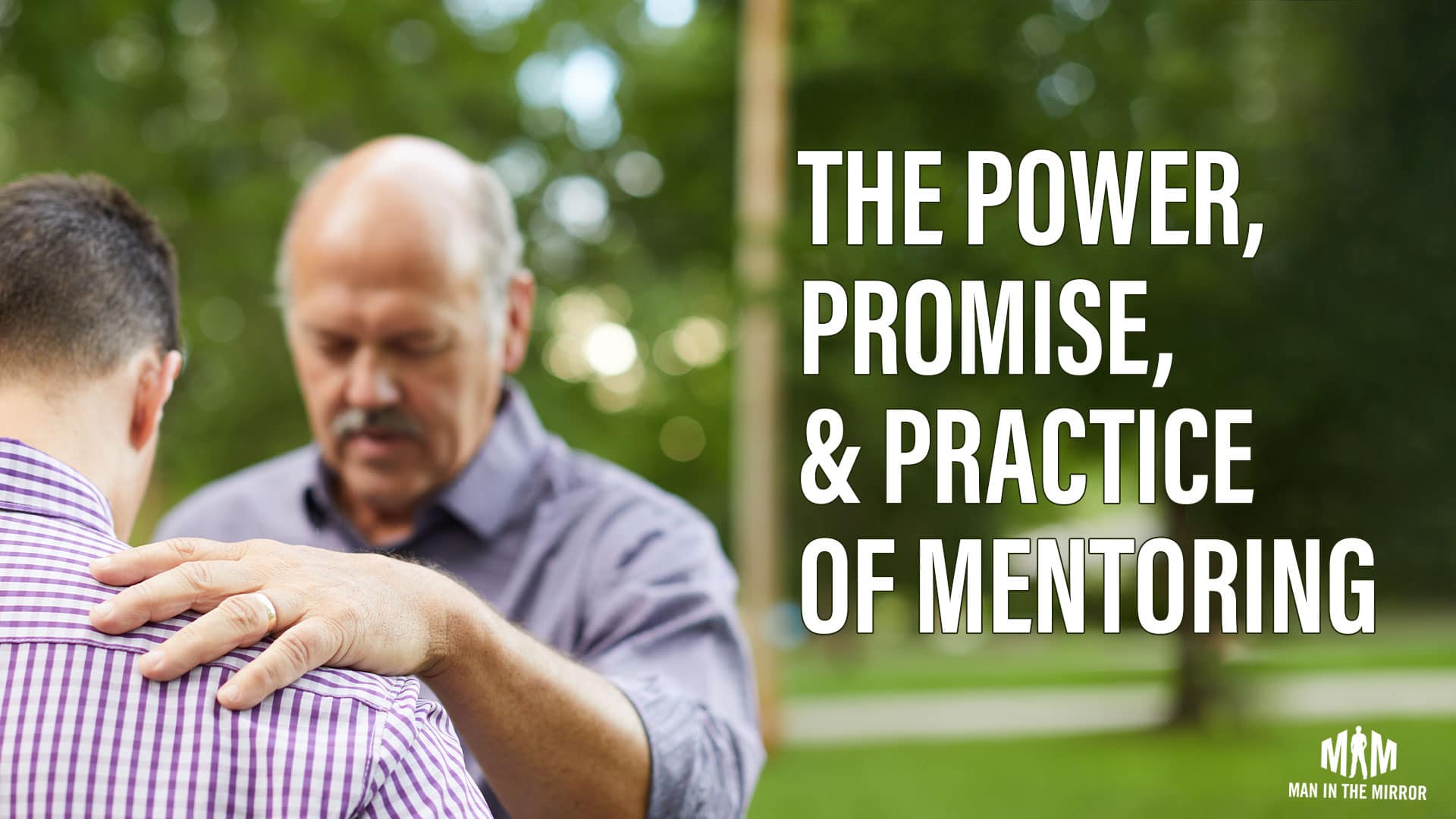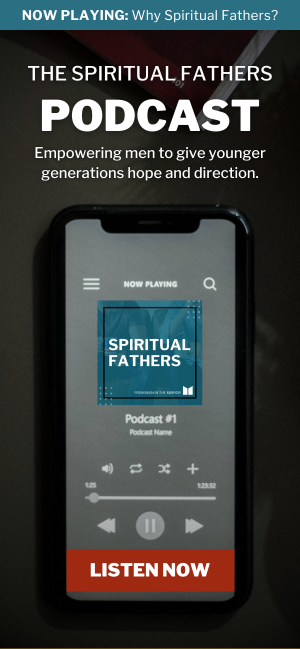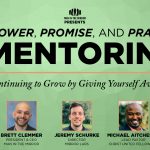Mentoring: Grow By Giving Yourself Away

The following Q&A excerpts are from our recent webinar on mentoring. Panelists include:
- Brett Clemmer, the president and CEO of Man in the Mirror,
- Michael Aitcheson, the lead pastor of Christ United Fellowship in Orlando and co-host of the As In Heaven podcast,
- and Jeremy Schurke, a former pastor and missionary, and current director of Mirror Labs, the R&D division of Man in the Mirror focused on reaching men in their 20s and 30s.
Brett Clemmer guided the discussion on the power, promise, and practice of mentoring for Christian men. The responses below have been edited for clarity and brevity.
What is mentoring?
Michael: My quick and easy definition is: Proximate relationship + two-way conversation + time = mentoring.
Said another way, a great recipe for a healthy mentoring relationship is life-on-life discipleship with sincere vulnerability, shared wisdom, and an exchange of ideas over time.
Proximate relationship + two-way conversation + time = mentoring.Click To TweetIs there a difference between mentoring and discipleship?
Michael: To me, mentoring is a kind of discipleship and so I use the terms almost interchangeably. I even throw “fathering” into the mix. It’s more than a head-oriented discipleship though. You’re teaching someone about the word of God, yes, but the type of discipleship that I experienced was a caught more than taught exchange. I saw the application of the word of God to all areas of life. I got to see decisions made; I got to experience thoughts; I got to see a person fail; and I got to see a person succeed.
Brett: But having a mentor is different than having brothers. I’ve got some guys in my life that are brothers; we walk through life together. We certainly challenge each other and tell each other when we’re being dumb, but that’s a different relationship than the relationship with a spiritual father or a mentor, which I feel like includes more wisdom, knowledge, and experience at the base. And hopefully it has a lot of love, curiosity, and compassion on top of that.
THE POWER of mentoring
Jeremy: When your life is transformed, that’s not a solo endeavor. You can’t do that by yourself. So the power is through relationship with someone else. Through the correction and care of a mentor, a man can unlock his God-given potential—to become who God created him to be.
THE BIG IDEA: Men, it’s time to grow by giving yourself away to someone else. Who is God calling you to invest in?
Michael: I think of a man named Gifford Ramsey. He was a state trooper, and Gifford Ramsey could dine with the governor and the guy on the street corner in the same night, at the same table, and make both of them feel equally important. He poured into me in this way and made me feel valued. He simply pulled me in and took me along with him. He took me to radio interviews. He invited me to his house.
He was also one of my football coaches and spiritual leaders on the team. I remember an incident at a game when I got angry and was given a 15-yard penalty. And who did I hear yelling from the sideline with his high soprano voice? “Mike, I told you the devil out here, too. The devil out here on the football field.” And to this day, I hear Gifford Ramsey’s voice reverberating in my mind constantly. I look back at how much he was investing in ways that I can only fully understand and appreciate as an adult.
Jeremy: When I was in high school, there was a man named Wink who kind of became my spiritual father of sorts. There was nothing particularly outstanding about him. The thing that stood out about him amongst all the other dads was that every other dad spoke down to me, but he spoke level with me with dignity, which I didn’t have a lot of back then. He showed me what hospitality was.
I remember he’d say, “Hey, if you’re ever around here, if you ever need a place to stay, if you’re ever in trouble, here’s the garage code. Just come in, we’ll cook you breakfast, sleep wherever you can.” And I did multiple times. Wink was just inviting me more into relationship—into sonship in a way—and prepping me to see what God the Father is like.
Discipleship was a caught exchange more than a taught exchange.Click To TweetTHE PROMISE of mentoring
Michael: I think mentoring promises four things: community, security, dignity, and identity.
With community, you’re not doing life by yourself. Somebody is with you. Someone has decided to raise you up, do life with you, and watch you go off.
You’ve got security. The Bible says there’s wisdom or safety in the counsel of many. Having someone investing in you who may have taken a few more steps than you have, who may have stepped off a few cliffs, who may have had blunders that can prevent you from having the same experience—gives you security.
Now we’re all going to experience pain, and it’s where we live; we live in a broken world, so there’s no way to avoid it. But there is an unwise and unhelpful way to go headlong into unnecessary pain. Mentoring helps provide practical and emotional security. And you understand that you’re not by yourself.
The third is dignity. No matter what age or stage a person is in, dignity. How sweet is it to have someone say that you matter? Hopefully, we all have had experiences where someone has looked at us and taken a certain interest in us. And that changes our mental and emotional state of being. It moves us to action when people help dignify us, humanize us, and help us understand that we are somebody and we do matter.
And then the last thing I would say is identity. A friend told me that when I was in seminary, “You’re always a man under authority.” It’s true, whether we want to accept it or not—no matter how much power we have. Because God created us. There’s always going to be this creator-creature distinction. And I think mentoring helps remind us in the healthiest of ways that there’s always someone over us. You are a son.
Jeremy: In the Great Commission verses, the last line is Jesus’ promise and reminder that He’s with us always to the end of the age. And it’s a helpful promise for me as I’m mentoring someone—to know that I’m not doing it as an obedient follower; I’m doing it as a son who has relationship with God in the midst of it. Because He’s with us always, including when we’re mentoring someone, and we can be in the presence of God while doing this work.
Mentoring promises four things: community, security, dignity, and identity.Click To TweetTHE PRACTICE of mentoring
Should there be an age gap?
Jeremy: To me, mentoring implies a gap in age where someone with more life experience and knowledge and wisdom—collected wisdom—can pass it on to someone younger. There is something to being able to say: “I know what you’re going through because I’ve been through it, and now I’m on the other side and I have perspective that gives me wisdom beyond just knowledge.” And so, while it’s not necessary, I do think it’s highly beneficial.
Michael: Sometimes there’s also an emotional age to consider. There are men we probably know in our lives who are older men, but we realize that we’re emotionally older than them in terms of maturity.
Brett: Certainly, a mentor should be a more spiritually mature guy, at minimum.
Jeremy: A lot of times growing up in the Christian faith, I hear about co-mentoring, group mentoring, and things we do collectively. And at the heart of it, I don’t hear a lot of older men of the faith taking young men under their wing and raising them up and mentoring them—of discipleship being passed down from one generation to the next. To have what I refer to as an “elderly elder” is a longing and desire I have for my own life.
Michael: I am really big on the idea of covenant, especially as we see it in the Bible. We’ve got the Patriarchs. We’ve got Abraham, Isaac, Jacob, and the children of Israel. And you hear “first generation,” “second generation,” and all this familial talk. And we see the continuation of the covenant, or continuation of this relationship or arrangement over generations.
I heard about a young lady who stood up at this gathering at her church and started singing Amazing Grace. She had a beautiful, beautiful voice; it just stirred the place, full of soul. But then an older lady in her 80s or 90s—leather hands, gray hair, wrinkled skin, a body that was a little frail—stood up to sing the same song.
And there wasn’t a dry eye. There wasn’t a person left sitting in their seat. That lady’s life, her testimony, her walk with God, was brought to bear on that song. There’s something about the elders that, in God’s kindness, remind us that we’ll make it, that they’re with us. I think of Psalm 78—recount the wonderful deeds of the Lord and tell the coming generations—when I’m around people who have been walking with Jesus longer than I’ve been alive.
They don’t have to say anything else about God’s faithfulness. I get it. I look at them and I say, “Yes, God is faithful.” And I’ve had a number of those older people in my life who have made an impact on me, dating back to high school.
Does there need to be a defined time period?
Jeremy: Not necessarily. In my mind, there’s an obvious beginning but not an obvious end to mentoring, because in a lot of ways, there’s really no arrival. It’s doing life together.
Can you mentor more than one person at a time?
Michael: You’ve got to evaluate how much capacity you have to actually be what those guys need you to be. And what I’ve come to understand is that it changes as the seasons go on. I mentor—closely right now—three guys, who each have a strong amount of my time and access to me. There are some more in the making, but again, I pray about that and evaluate my capacity to be faithful to our arrangement and our relationship.
Should you use a resource or curriculum?
Jeremy: In my opinion, definitely. Men need order. When our lives are in chaos—and they are in different ways and in areas—we need other men to help us order our lives. I think a book or study is a great way to do that. A problem I see though is when we have predetermined curriculum and books that we want to use without knowing what the mentee needs. To determine what that is before you even know the person seems to be throwing spaghetti on the wall to see what sticks.
How do you choose who to invest in?
Brett: You don’t have to find a guy that’s on his way spiritually before you’re ready to invest your life in him. God’s going to call you to invest your life in someone regardless of where he is spiritually. You have to listen to the voice of the Holy Spirit saying this is the guy.
Jeremy: I’m not going to try to choose the mentee who I think has the most capability and capacity. I think as the mentor, our responsibility is listening to the voice of God and the inner stirrings of our heart to know who He’s leading us to, and then being obedient to that. Because it isn’t like picking a team for Dodge Ball. We want God to direct us.
Michael: Our social circles—plus the Holy Spirit—will land us on a starting point faster and more effectively than we think. There are people in our circles that, if we just say, “Lord, can you help me see who’s already in my circle that would benefit from a relationship like this? And from whom I’d benefit from having a relationship with?” then God will reveal that person in His time that he wants you to invest in.
And just be open to being surprised. Pay attention to the people who are already around you, even if they seem to be acting in a way that’s passive aggressive or aloof. Don’t limit who you think God might want you to mentor or invest in.
Choosing who to invest your lives in isn't like picking a team for Dodge Ball. You want God to direct you.Click To TweetWhat should happen at the initial meeting?
Brett: You sense that God has revealed someone to you that He wants you to invest in. So what’s next? I think a good starting point is acknowledging to them that you see something in them that makes you want to get to know them more.
Michael: There’s no formula. Inviting someone to go out for a meal is a good starting point though. Just bring who you are to the table, with humility and curiosity, and take an interest in him.
Jeremy: I think sometimes you don’t need to start with “the plan.” You just need to start. You need to have the initiative and conviction that 1) this is something you want to do, and 2) this is someone you want to get to know better and potentially help.
Just start at a baseline of getting to know the person, because every person wants to be known. “Hey, tell me about yourself, tell me your story,” etc. Then as you’re listening and following up, there will be some obvious connection points that emerge. I think if you’re in the rhythm of actively listening and seeing where your lives kind of intertwine, then you’ll realize how you can genuinely help this person or where you can point them for guidance.
Michael: I think as you’re asking questions, an important one to ask before beginning a mentoring process is, “Hey, how does this sound to you? Is this something you’re interested in?” Give them a sense of ownership, a sense of buy-in, a sense of volition in the matter. Some of you are taking a risk and that’s good. We have to take a risk, but we need the humility to say, “Hey, is this something that you would like?” Give them an opportunity to decide whether or not it’s something they want.
What if you’ve tried and failed?
Brett: I think there are some guys who are a little frustrated. They feel like they’ve maybe tried to be a mentor to someone, and it always fizzles out, or guys just don’t really respond well to them.
Jeremy: First, you’re probably not the first person that’s been in their life and tried to mentor them; likely, they have had a lot of disappointment. So be mindful of that.
But second, I would encourage you to take a deep, long look in the mirror and ask, “Am I living a life that someone else would want to imitate?” What I’ve seen is that guys aren’t necessarily looking for sages, theological champions, CEOs of companies, etc. All those are great, but ultimately, they’re looking for guys they can imitate and hopefully become, because the life they’re living is inspiring to them.
If you are living a life like that, and you’ve struck out a few times, well, be like the midnight visitor in the parables; just keep knocking. Just keep banging on that door, and someone will answer.
Brett: It’s also possible that you need to find a mentor of your own right now. I think we all need someone that can reflect back to us, honestly, about what our own life looks like. For example, my wife does that for me; she reflects back to me when I have a weird habit or a bad attitude about something.
Or we have guys in our lives who can speak truth to us as a peer. But if you’re a guy who really has no peers—if you’re short on friendships—I think it’s actually going to be tough for you to be a decent mentor because you’re trying to offer something that you don’t have yourself.
What makes a good mentor?
Michael: You need to be committed. The worst thing you can do is tell someone that you’re going to mentor them or you’re going to be there for them and then not be consistent.
A younger man won't hear or listen to your wisdom until he feels cared about by you.Click To TweetBrett: I think as I get older and acquire more knowledge and experience, there is a paradox in play where I need to be more reticent to share that. What I mean by that is that I need to ask questions, not teach lessons. I mean, you’ve learned these lessons and gone through failures and had experiences, and I think there’s an honest urge to just jump in and say, “Well, this is what you should do.”
And so, for me personally, what I try not to ever do is answer a question that I haven’t been asked. Instead, I try to ask a lot of questions to draw a guy out so he can share where he’s at. And then if he asks a question, I’m happy to answer it.
Sometimes a guy will sit in front of you who you’ve got 20 years on, and he may say some stupid stuff, but just to be patient and loving in those times. Don’t feel like you have to vomit every piece of knowledge that you’ve accumulated, because it just comes across as condescending and self-righteous—the things you don’t want to be. Instead, we’ve got to draw back and be willing to sacrifice our own right to speak in a sense, until those questions gets asked that we can share our answers to.
Jeremy: And above all, they’re not going to hear or listen to your wisdom until they feel cared about by you.
♦♦♦







